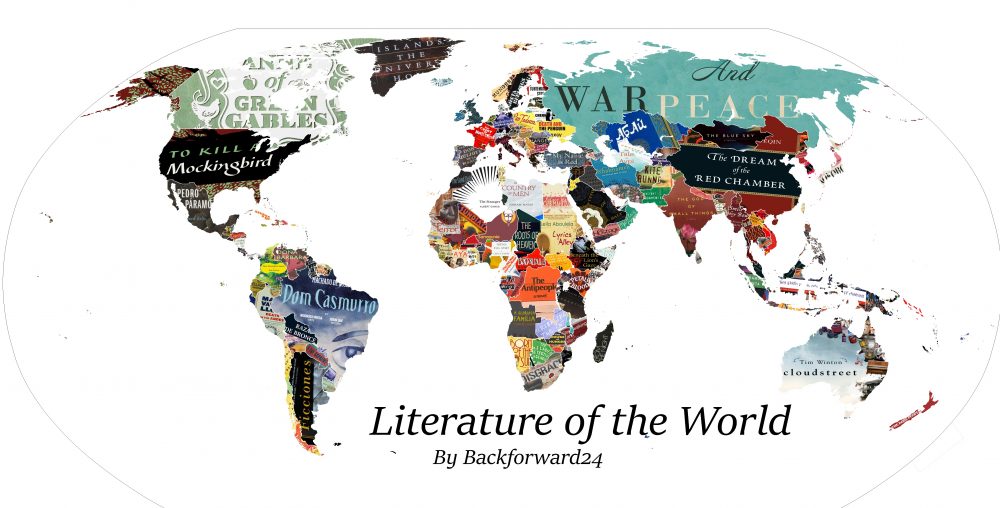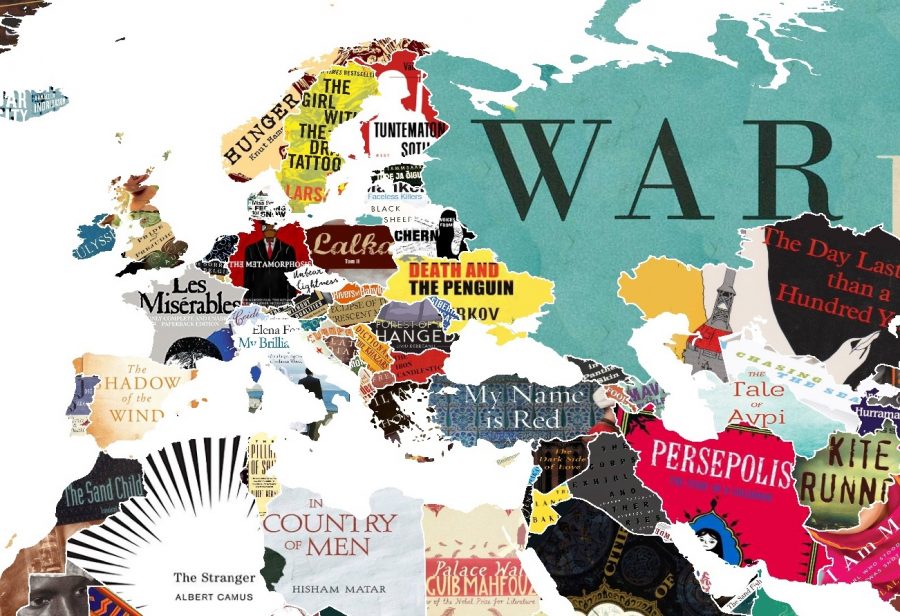
Begun by user “BackForward24” and crowdsourced through Reddit, this map of the world illustrates the most beloved/popular book of each country by pasting a scan of the book cover over its space on the world map. For book lovers who want to read themselves around the world, it will prove invaluable. (And if you can’t read the map, no worries, there is a text version available.)
But let’s unpack the larger (and yes, first world) countries first. The United States is represented by To Kill a Mockingbird, which ticks off a lot of the marks that make it quintessentially American: most high schoolers have read it, and it deals with both racism and our shameful history and the faith that the law can eventually right wrongs. Canada has Anne of Green Gables. Great Britain has Charles Dickens’ Great Expectations, and Ireland Ulysses (no surprise there.)
Our Australian readers might want to weigh in on Tom Winton’s Cloudstreet (a quite recent novel), and New Zealanders please tell us about The Bone People by Keri Hulme.

My takeaway and possibly yours from the map is how many titles are new to the Westerner. Europe has some familiar titles: Spain gets Cervantes’ Don Quixote (of course), Italy gets Dante’s The Divine Comedy, and France gets Les Misérables by Hugo. And while Russia is represented by Tolstoy’s War and Peace, Eastern Europe is rather unfamiliar, at least compared to South America, where Argentina has Borges’ Fictions, Chile has Isabel Allende’s The House of Spirits, and Colombia has Marquez’s One Hundred Years of Solitude, all well known from decades of prizes, book club attention, and film adaptations.
This Reddit thread contains much criticism and debate, so please check it out. Some good points are raised: if the Iliad represents Greece, why not the Mahabharata/Ramayan for India? “Honestly there is work to do (in) the Africa part,” says another (very politely). There’s also debate over countries not being represented at all, such as Tibet (under Chinese occupation), along with Western Sahara, Somaliland, Kashmir, Balochistan, and Kurdistan. Frankly, if you start trying to talk about the culture of nations, there will be debate over what constitutes a nation. (I’m not sure if Palestine is covered, but some Redditors are voting for Susan Abulhawa’s Mornings in Jenin.)
Another thing to keep in mind: the novel is very much a Western genre. For many countries, that might not be the case. However, I sense that that debate (and future map) will be another Reddit thread, somewhere, sometime.
Related Content:
A Map Showing How Much Time It Takes to Learn Foreign Languages: From Easiest to Hardest
An Interactive Map of Every Record Shop in the World
Ted Mills is a freelance writer on the arts who currently hosts the artist interview-based FunkZone Podcast and is the producer of KCRW’s Curious Coast. You can also follow him on Twitter at @tedmills, read his other arts writing at tedmills.com and/or watch his films here.


The idea is a cool one, and I hope the creator continues to develop it. The methodology, however, is unclear and should thus be viewed with caution. It seems that many of the books are written about a place for a Western (American?) audience. The books for India and Cuba, for example, are mostly unknown within those countries. That is a shame, as those two countries have a plethora of rich and famous literature, e.g., Tagore, Carpentier. I can only guess that many of the other countries are the same. My guess is supported by the comments on the Reddit page.
To answer one of your points, The Bone People is a fantastic book. It was NZ’s first Booker Prize and, similar to Huck Finn, tries to address the question of how the country moves forward with the complicated relationships between the Maori (native people of NZ) and Pakeha (Europeans).
As always, thanks for posting this and all the stuff you do at OC.
This is the superb for literature student.
I know this that I will enjoy with this idea…
Morning in Jenin covering Israel instead of Palestine is pretty lame. Would be nice to see an Amos Oz or maybe Nobel literature laureate Shai Agnon book there.
Ireland — Gulliver’s Travels
A short note — The Australian author of Cloudstreet is Tim Winton (not Tom).
The article says Spain->Don Quixote and Italy->The Divine Comedy, but on the map I see The Shadow of the Wind and My Brilliant Friend, respectively.
Bill, check the link to the original map — Quixote, Divine Comedy, and others are different over there. Not sure what happened, maybe the one posted above is just popular books of the 20th century or the last 20 years or something.
The Israeli entry is baffling: it’s some obscure book originally written in English. I would have expected something by Oz or Agnon, or rather the most obvious one: the Bible.
Lol, how Albert Camus is algerian ? Sorry, but it doesn’t seems a serious work !